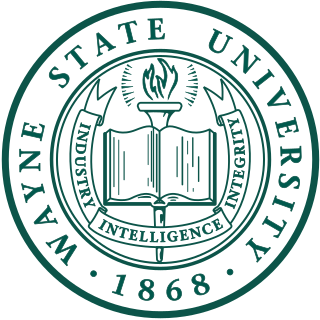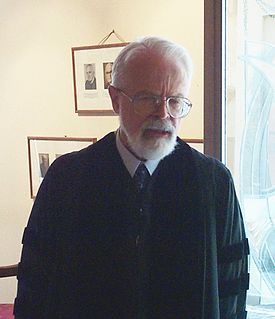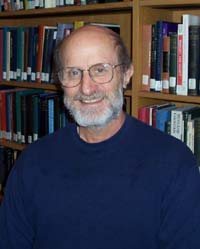David H. Sanford (born 1937) is a professor of philosophy at Duke University. He specializes in perception and metaphysics.

Duke University is a private research university in Durham, North Carolina. Founded by Methodists and Quakers in the present-day town of Trinity in 1838, the school moved to Durham in 1892. In 1924, tobacco and electric power industrialist James Buchanan Duke established The Duke Endowment and the institution changed its name to honor his deceased father, Washington Duke.

Perception is the organization, identification, and interpretation of sensory information in order to represent and understand the presented information, or the environment.

Metaphysics is the branch of philosophy that examines the fundamental nature of reality, including the relationship between mind and matter, between substance and attribute, and between possibility and actuality. The word "metaphysics" comes from two Greek words that, together, literally mean "after or behind or among the [study of] the natural". It has been suggested that the term might have been coined by a first century CE editor who assembled various small selections of Aristotle’s works into the treatise we now know by the name Metaphysics.
Sanford studied at Cass Technical High School, Oberlin College and at Wayne State University. He received his Ph.D. from Cornell University in 1966, taught at Dartmouth College from 1963 to 1970, and joined the Duke Faculty in 1970. He has been a visiting professor at the University of Michigan and the University of Oregon.

Cass Technical High School, commonly referred to as Cass Tech, is a four-year university preparatory high school in Midtown Detroit, United States. The school is named in honor of Lewis Cass, an American military officer and politician who served as governor of the Michigan Territory from 1813 until 1831. The school is a part of Detroit Public Schools.

Oberlin College is a private liberal arts college in Oberlin, Ohio. Founded as the Oberlin Collegiate Institute in 1833 by John Jay Shipherd and Philo Stewart, it is the oldest coeducational liberal arts college in the United States and the second oldest continuously operating coeducational institute of higher learning in the world. The Oberlin Conservatory of Music is the oldest continuously operating conservatory in the United States. In 1835 Oberlin became one of the first colleges in the United States to admit African Americans, and in 1837 the first to admit women.

Wayne State University (WSU) is an American public research university located in Detroit, Michigan. Founded in 1868, WSU consists of 13 schools and colleges offering nearly 350 programs to more than 27,000 graduate and undergraduate students. Wayne State University is Michigan's third-largest university.
Much of Sanford's work is about conditionals. His book If P, Then Q: Conditionals and the Foundations of Reasoning was published in 1989, second edition 2003,
Sanford's influence in analytic philosophy extends well beyond his published work in metaphysics. From 2006 to 2007, he was president of the Society for Philosophy and Psychology.

Analytic philosophy is a style of philosophy that became dominant in the Western world at the beginning of the 20th century. The term can refer to one of several things:

David Kellogg Lewis was an American philosopher. Lewis taught briefly at UCLA and then at Princeton from 1970 until his death. He is also closely associated with Australia, whose philosophical community he visited almost annually for more than thirty years. He made contributions in philosophy of language, philosophy of mind, philosophy of probability, metaphysics, epistemology, philosophical logic, and aesthetics. He is probably best known for his controversial modal realist stance: that (i) possible worlds exist, (ii) every possible world is a concrete entity, (iii) any possible world is causally and spatiotemporally isolated from any other possible world, and (iv) our world is among the possible worlds.
Dorothy Margaret Doig Edgington FBA is a philosopher active in metaphysics and philosophical logic. She is particularly known for her work on the logic of conditionals and vagueness.
Bastiaan Cornelis van Fraassen is a Dutch-American philosopher. He is a Distinguished Professor of Philosophy at San Francisco State University and the McCosh Professor of Philosophy Emeritus at Princeton University, noted for his seminal contributions to philosophy of science.
Frank Cameron Jackson FBA is an Australian analytic philosopher, currently Emeritus Professor and former Director of the Research School of Social Sciences at Australian National University. He was also a regular visiting professor of philosophy at Princeton University from 2007 through 2014. His research focuses primarily on philosophy of mind, epistemology, metaphysics, and meta-ethics.

Robert Merrihew Adams is an American analytic philosopher of metaphysics, religion, and morality.
Jonathan Francis Bennett is a British philosopher of language and metaphysics, and a historian of early modern philosophy.
Michael E. Bratman is an American philosopher who is Durfee Professor in the School of Humanities & Sciences and Professor of Philosophy at Stanford University.
Sydney Shoemaker is an American philosopher. He is the Emeritus Susan Linn Sage Professor of Philosophy at Cornell University and is well-known for his contributions to philosophy of mind and metaphysics.
Robert C. Stalnaker is an American philosopher, who is Laurence S. Rockefeller Professor of Philosophy at the Massachusetts Institute of Technology. He is a Fellow of the American Academy of Arts and Sciences and a Corresponding Fellow of the British Academy.
John Niemeyer Findlay, usually cited as J. N. Findlay, was a South African philosopher.
William G. Lycan is an American philosopher and Professor Emeritus at University of North Carolina at Chapel Hill, where he was formerly the William Rand Kenan, Jr. Distinguished Professor. Since 2011, Lycan has also been Professor of Philosophy at the University of Connecticut, where he continues to teach.
Jorge J.E. Gracia is the Samuel P. Capen Chair, SUNY Distinguished Professor in the Department of Philosophy and Department of Comparative Literature in the State University of New York at Buffalo. Gracia was educated in Cuba, the United States, Canada, and Spain, and received his Ph.D. in Medieval Philosophy from the University of Toronto.
Paul Humphreys is a significant contributor to the philosophy of emergent properties, as well as other areas in the Philosophy of science and Philosophy of probability. He is a Professor of Philosophy at the University of Virginia, specialising in philosophy of science, metaphysics, and epistemology. His current interests include the metaphysics and epistemology of emergence, computational science, empiricism and realism, and strategy.
Michael Richard Ayers, is a British philosopher and professor emeritus of philosophy at the University of Oxford. He studied at St. John's College of the University of Cambridge, and was a member of Wadham College, Oxford from 1965 until 2002. Among his students are Colin McGinn and William Child.
Sir Richard Rustom Kharsedji Sorabji, is a British historian of ancient Western philosophy and Professor of Philosophy Emeritus at King's College London. He has written his 'Intellectual Autobiography' in his Festschrift: R. Salles ed., Metaphysics, Soul and Ethics in Ancient Thought, 1–36. He is the nephew of Cornelia Sorabji, the first woman to practice law in Britain and India.
Frederick Earl Sontag was a professor of philosophy and author. He taught at Pomona College in Claremont, California from 1952 to 2009, retiring shortly before his death.

Lawrence Sklar is an American philosopher. He is the Carl G. Hempel and William K. Frankena Distinguished University Professor at the University of Michigan.
Ian Rumfitt is a British philosopher currently serving as a senior research fellow of All Souls College, Oxford.
Herbert James Paton FBA FSA Scot, usually cited as H. J. Paton, was a Scottish philosopher who taught at various university institutions, including Glasgow and Oxford. He worked in British intelligence during the two world wars and played a diplomatic role on behalf of Poland at the 1919 Versailles conference. In 1968, the year before his death, he published The Claim of Scotland, a plea for greater general understanding of the constitutional position of his own native country.
David-Hillel Ruben is a University of London professor emeritus of philosophy, now at Birkbeck College, University of London. He gained his PhD in Philosophy at Harvard University (1971). He previously held posts at the Universities of Edinburgh and Glasgow, Essex University, The City University London, and the London School of Economics. He served as Founding Director of NYU's campus programme in London. His research relates to the philosophy of the social sciences, metaphysics, and the philosophy of action. In 2011, Ruben resigned from the Universities and Colleges Union (UCU) in protest at their stance on anti-Semitism.









